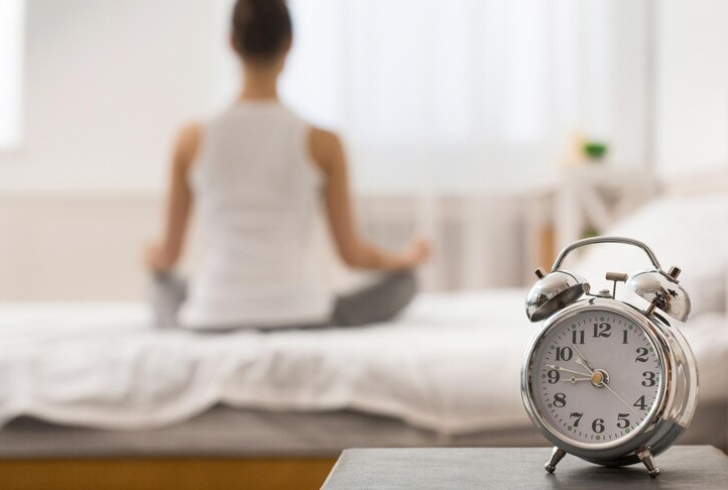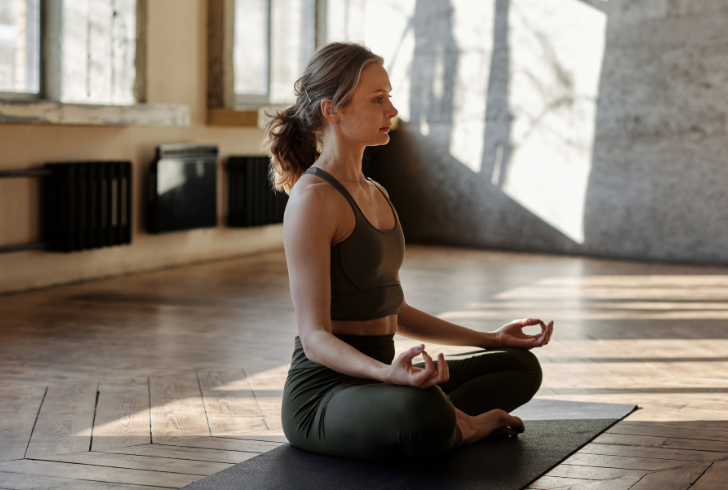Meditation can have a profound impact on mental clarity, emotional balance, and focus. But when is the best time to meditate to achieve the most benefits? Many people wonder how to fit it into their already packed schedules. The truth is, finding time for meditation can be simpler than it seems, especially when it becomes a regular part of your routine. Even amidst a busy day, a few minutes of mindfulness can help sharpen your focus and reduce stress.
Let's explore the optimal times for meditation and some tips to incorporate it into daily life.
Why Making Time for Meditation Is Crucial

Image by prostock-studio on freepik | Meditation helps calm your mind and improve focus.
In today’s fast-paced world, it’s easy to overlook the importance of mental well-being. Yet, research emphasizes just how detrimental neglecting your mind can be. Psychologists at Harvard University found that nearly 47% of our waking hours are spent lost in thought, often about things that either happened in the past or might happen in the future. This constant mind-wandering can have a serious impact on mental health, making it harder to stay focused and engaged in the present moment.
Finding a few minutes each day to meditate can help you break this cycle of overthinking. The practice not only brings you into the present but also helps enhance focus, improve decision-making, and manage stress. Furthermore, mindfulness meditation has been shown to improve emotional health, reduce anxiety, and even boost physical health by lowering blood pressure and improving sleep quality. By prioritizing meditation, you’re actively investing in your ability to perform at your best.
The Best Time to Meditate - Morning or Evening?
While meditation is beneficial at any time of day, many people find morning meditation to be particularly effective. The morning is typically the quietest time, with fewer distractions. Meditating first thing in the day helps set a positive tone, grounding your thoughts and calming your mind before you dive into a busy schedule. This can be particularly helpful for staying focused and productive throughout the day.
For some, starting the day with meditation offers a feeling of accomplishment and peace, which is especially beneficial when juggling multiple tasks. It provides a sense of clarity and readiness to tackle challenges head-on. Plus, once you begin the day with meditation, it becomes easier to make it a habit, allowing the practice to flow naturally into your routine.
However, meditating in the morning might not suit everyone. For those who have a more unpredictable schedule or struggle to find quiet moments in the early hours, meditation can also be effective at other times of the day.
Ideal Times for Meditation Beyond Morning
If mornings don’t work, other times throughout the day may be better suited for meditation:
1. After Lunch: Meditation during a lunch break can help reset your mind and body after a busy morning. A quick session can alleviate any mid-day stress and enhance focus for the remainder of the day.
2. Late Afternoon: For those who experience fatigue or mental fog in the late afternoon, a short meditation session can refresh and re-energize the mind, allowing for more focus and clarity in the final hours of work or study.
3. Before Bed: Meditating before sleep can significantly improve sleep quality. It helps calm the mind and prepares the body for rest, promoting deeper, more restful sleep.
Ultimately, when is the best time to meditate depends on individual schedules and preferences. It’s important to experiment and find a time that works best for your body and mind.
Tips for Making Meditation Part of Your Daily Routine
To make meditation a consistent part of your day, it’s helpful to build it into your existing habits. Establishing a daily meditation practice can start with these simple tips:
1. Set a Consistent Time: Aim to meditate at the same time every day. Whether it's in the morning, during lunch, or before bed, consistency helps turn meditation into a habit.
2. Use Anchor Habits: Pair meditation with another activity. For example, meditate right after brushing your teeth or while waiting for your coffee to brew. This helps create a routine that you won’t forget.
3. Start Small: Begin with just five minutes. This makes it easier to commit to meditation, especially when your schedule is tight. As you get more comfortable, you can gradually increase the duration.
4. Be Flexible: Life happens, and not every day will go as planned. If you miss a session, don’t stress. Simply adjust your schedule and make time for meditation the next day.
How Meditation Apps Can Help
For those who find it challenging to meditate on their own, guided meditation apps like Headspace can offer valuable support. These apps provide a wide range of meditation sessions, from short 3-minute sessions to longer, more in-depth courses. Whether the focus is on stress relief, sleep, or improving concentration, these apps can help keep meditation manageable and accessible, even on the busiest days.
Some apps also offer “one-minute” meditation breaks for those with only a few minutes to spare, making it possible to meditate on even the most hectic days. Using a meditation app can act as a reminder and motivator to prioritize mindfulness, helping build momentum and maintain consistency.
Best Practices for Staying on Track
Sticking to a regular meditation routine can sometimes be challenging, especially when life gets busy. Here are a few strategies to stay consistent:
1. Track Your Progress: Keep a meditation journal or use an app that tracks your sessions. Seeing how many days in a row you’ve meditated can be a motivating factor to stay on track.
2. Don’t Be Hard on Yourself: If you miss a session, avoid being critical. Meditation is a practice, and it’s okay to skip a day here and there. Focus on getting back into your routine the following day.
3. Set Realistic Expectations: Meditation is a skill that takes time to develop. Be patient with yourself and allow the practice to evolve at your own pace.
The Benefits of Meditation

Pexels | Cliff Booth | Meditation improves focus and reduces stress.
Meditation is much more than just a relaxation technique; it’s a tool for enhancing focus, emotional intelligence, and overall well-being. Regular practice has been linked to numerous benefits, including:
1. Reduced Stress: Meditation lowers levels of cortisol, the stress hormone, helping you feel more relaxed and at ease.
2. Improved Focus: Mindfulness meditation helps sharpen attention and improve concentration, which can lead to greater productivity.
3. Better Emotional Health: Meditation encourages a more compassionate mindset, reducing negative emotions like anxiety, fear, and irritability.
4. Enhanced Sleep: By calming the mind and body, meditation can improve sleep quality, helping you fall asleep faster and stay asleep longer.
Consistency is Key
The key to effective meditation is making it a regular part of your routine, no matter when you choose to practice. Whether it’s in the morning, afternoon, or evening, meditation can significantly improve mental clarity, emotional resilience, and overall well-being. Start small, stay consistent, and make meditation a priority. Over time, the positive impacts on your focus and stress levels will become clear.










